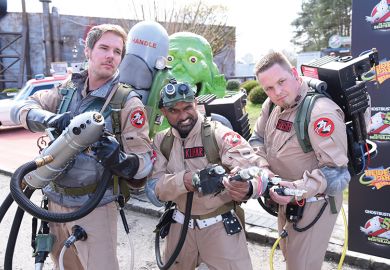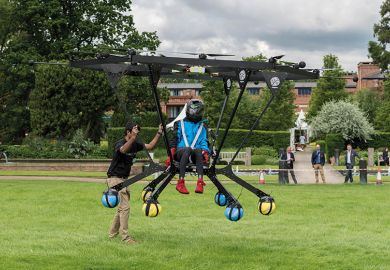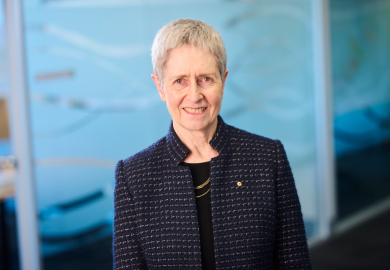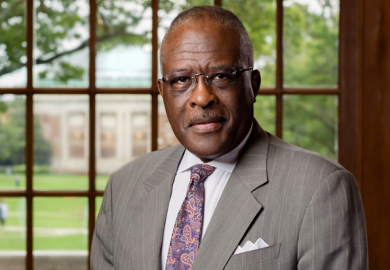“When you want to defend science publicly, you don’t get a lot of support,” concedes the pharmacist and science communicator Olivier Bernard. “Even my colleagues were telling me ‘you are so courageous’ – and I thought: ‘Thank you, but can you do something? That would be more helpful.’”
Bernard had provoked a ferocious backlash from supporters of alternative medicine after he spoke out on his blog, The Pharmafist, against their lobbying of the Quebec government to introduce vitamin C injections as a cancer treatment. His explanation of where popular perceptions about vitamin C differ from what has been scientifically demonstrated – interspersed with humorous cartoons – prompted activists to lobby for him to be fired from his pharmacy job and removed from the professional register. They also tried to get his TV show cancelled and urged supporters not to buy his wife’s book (on an unrelated topic). They even resorted to sending death threats to Bernard and his family.
“When you are passionate about what you do, you try to do good work,” he tells Times Higher Education. “But when you come home and people are threatening you, you do begin to wonder if it’s all worth it.”
A posting on Facebook about the hate campaign he was facing also provoked a big reaction – but this time it came from the science community in his support. The petition to introduce the vitamin C treatment was rejected and the Quebec government has created a task force to protect scientists who speak on sensitive topics, as well as an inter-professional advisory committee to support healthcare professionals who speak publicly.
That’s what was missing, Bernard believes. Referring to the initial silence from colleagues, he says: “I’m not trying to shame them; I understand why they would not want to do it. But having support is key.”
Bernard recently received further validation, being named in November as the early career winner of this year’s John Maddox Prize. The prize, a joint initiative between the science advocacy organisation Sense about Science and the journal Nature, is awarded annually to individuals who promote science and evidence in the face of hostility.
“I hope that my winning will raise awareness and more people in the scientific community and government will realise that if we don’t do something [the pushback] will get worse and worse – and then at some point it won’t be possible to talk about science without getting these kinds of threats,” he says.
The Maddox prize has been awarded since 2012, but in today’s climate of political polarisation and anti-expert sentiment, it is arguably more relevant than ever. Despite an ever-growing mass of evidence for man-made climate change, US president Donald Trump continues to deny its reality. In the UK, Michael Gove’s remark during the Brexit referendum campaign that the public have had “enough of experts” still echoes menacingly around university corridors. And the wave of populism breaking around the globe comes with simplistic, often emotionally driven responses to complex questions. All of this promotes a climate in which those who voice inconvenient truths can find themselves the victims not merely of scepticism but of aggression, harassment and worse.
Just ask climate change scientists. Since long before even Trump himself thought he had a realistic shot at the US presidency, academics whose work shows the devastating impact that human activity is having on the Earth’s climate have faced enormous hostility. In 2009, for instance, climate change deniers hacked the emails of scientists at the Climate Research Unit at the University of East Anglia and used their contents to try to discredit their science by suggesting that they had manipulated the data and tried to suppress critics, initiating a scandal that became popularly known as Climategate.
A string of subsequent inquiries in both the UK and the US cleared the scientists of any misconduct. Yet abusive and threatening emails poured into the inboxes of the academics at the unit. In an interview in 2010 with The Sunday Times, Phil Jones, who led the institute, said that the attacks, which included death threats, had caused him to consider suicide. “I was shocked. People said I should go and kill myself. They said that they knew where I lived. They were coming from all over the world,” he told the paper.
Naomi Oreskes, professor of history of science and affiliated professor of Earth and planetary sciences at Harvard University, recently told THE that when she published a 2004 paper showing that there was a scientific consensus on climate change, her life also changed because she too “started being attacked”. Unperturbed, however, Oreskes went on to co-write (with Erik Conway, a historian at Nasa’s Jet Propulsion Laboratory at the California Institute of Technology) her award-winning 2010 book, Merchants of Doubt: How a Handful of Scientists Obscured the Truth on Issues from Tobacco Smoke to Global Warming, exposing the lengths to which companies will go to discredit work that threatens their profits.
This is a phenomenon known all too well by Bambang Hero Saharjo, professor of forest protection at IPB University in Indonesia and the main winner of this year’s Maddox prize. Saharjo is an expert on the destructive forest fires that regularly sweep through Indonesia, lit by palm oil companies that want to clear land cheaply and quickly. During four months in 2015, such fires released more carbon dioxide than the entire European Union.
Through his work, Saharjo has traced those who started those fires and has testified in hundreds of cases against the companies responsible. In 2015, his testimony was instrumental in a guilty verdict against the palm oil company JPP. The company reacted by filing a $33.5 million lawsuit against him in 2018.
Although that action ultimately failed, Saharjo’s efforts have come at a high personal cost, he tells THE, including “intimidation of me and my family”. Nor has he enjoyed much support from colleagues, many of whom in his field are paid a huge amount by the palm oil companies to testify on their behalf. These bought-off scientists “make statements that are false, even though they know that this is wrong”, Saharjo says.
“As a scientist, I cannot let this kind of activity and environmental destruction occur. As academics, we should say the truth and do the right things to solve the problem, not become part of the problem…I hope the [Maddox] prize will give me more power and support to fight the companies behind the fires.”
Tracey Brown, director of Sense about Science, says that Saharjo’s win was the upshot of the strongest consensus she has seen among Maddox prize judges. “He stood out not just because of the threats, the lawsuits and the abuse, in a country where corruption is a very dangerous thing, but also because he has colleagues who say to him: ‘Why don’t you give evidence for the other side: you’ll get a pay-off; you’ll live a nice life,’” she says. “He was surrounded by people who are silent either because of fear or they were bought. This year, we found ourselves really looking at those who are speaking up when others stay silent.”
According to Brown, the reach of the prize is growing: this year, there were 206 nominations from 38 nations, for instance. “In some countries, the bravery is quite astonishing,” she says, “particularly in societies where there is a lot of patronage and things get decided on the basis of who you upset and who you please.”
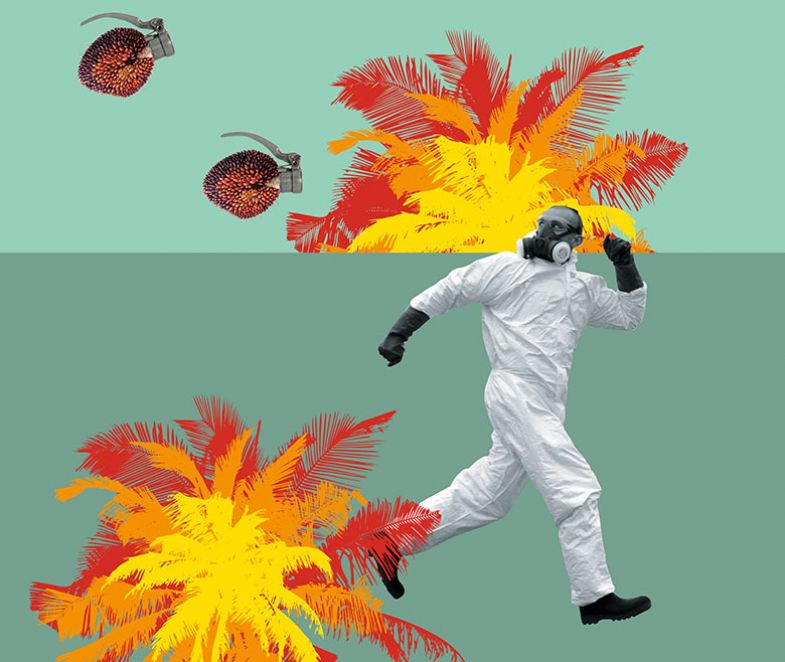
While upsetting those in political and industrial circles can result in the most peril for scientists and their families, it is attacks from activists that can be the most relentless.
As well as Bernard, another victim is Simon Wessely, professor of psychological medicine at the Institute of Psychiatry, Psychology and Neuroscience at King’s College London. When he began working on chronic fatigue syndrome (CFS) in the late 1980s, he felt that patients were getting a raw deal. If they were believed at all, they were mostly told to get bed rest and hope for a medical breakthrough, but research by Wessely and his colleagues showed that two approaches, graded exercise therapy and cognitive behaviour therapy, could help them manage their symptoms.
However, one patients’ group believed that Wessely was not treating CFS – also known as myalgic encephalomyelitis, or ME – as a serious illness. “We published our first paper and immediately got a lot of pushback…Right from the start, a small group of people started telling lies about us,” he says. “I was accused of throwing a boy who had CFS into a pool to see if he would sink or swim…After a break-in at the office of a UK patient group, in which computers were stolen, I was accused by Dutch ME activists of being responsible…Very early on, I learned that often when I was going to give a talk, the organiser would be sent a dossier about how vile and evil I was.”
Also circulating was one of the conference slides that he had posted online – except that his text had been changed “to reverse my meaning. Someone had downloaded it, changed it, and uploaded it again,” he says. “Now when people ask if I’ll send my slides round – which is quite normal practice – I have to say ‘I’m sorry, but no.’”
Threatening phone calls and hate mail resulted in police involvement, and even though Wessely gave up research on CFS years ago, “the stalking continues. It’s quite painful. I can’t deny that…Things have got easier in recent years, but it’s never over.”
Wessely now does research with the military in Iraq and Afghanistan. “I once told a meeting that I now feel safer. People took it as a joke – it wasn’t,” he says. “What I meant was, I feel emotionally safe. I don’t feel constantly stalked and harassed.”
A key form of harassment involves attempts to discredit academics professionally, particularly by abusing legal procedures and complaints pathways, Brown says.
An example is Linda Bauld, the Bruce and John Usher professor of public health at the University of Edinburgh, who has been hounded by the tobacco industry because her work exposed the dangers of smoking.
“For decades, they used well-established techniques to try and spread doubt about the science,” Bauld says. This included an internet hate campaign that smeared her work, particularly for the UK’s Department of Health. She was labelled either biased or lazy.
“The worst period I had was the trolling,” she recalls. “The police were involved. I had hate mail delivered to my door. I had anonymous phone calls.”
Ironically, her more recent work suggesting that e-cigarettes are less harmful than traditional cigarettes has elicited criticism that she is now in the pocket of the tobacco industry. The problem, she says, is that there are groups of researchers and policymakers who are in effect prohibitionist, rejecting the role of harm reduction in public health policy regarding tobacco. The fact that these opponents are within her own community “makes it really personal. You end up questioning: ‘Am I doing the right kind of science?’” she says.
Now researchers in Australia are digging into Bauld’s life and work, she says: “They find meetings I’ve attended to see if someone from the tobacco industry was there so they can say I am biased. But the accusations [that she is taking money from e-cigarette companies] are fundamentally wrong. The industry attacks were really unpleasant, but these are professionally hurtful in a different way.”
They mean that Bauld and her colleagues don’t get invited to certain conferences, or are indirectly prevented from publishing in certain journals. “I’m too old to worry about career progression, but you want to be taken seriously as an independent scientist in any forum you enter into, rather than people having a preconceived notion about how you conduct yourself,” she says.
Moreover, she adds, accusations that certain researchers are in the pocket of industry “undermine the public’s faith in any advice about smoking”. But the fact that tobacco is still a leading preventable cause of death feeds Bauld’s determination to continue.
Of course, as the palm oil example illustrates, it is not unknown for scientists genuinely to be ethically compromised. However, according to Fiona Fox, director of the Science Media Centre – which recently published a guide for researchers experiencing harassment – it is rare. What is more common is for researchers to take money from industry for legitimate purposes. For instance, vaccine trials are run with funding from vaccine manufacturers – but there are lots of integrity protections in place, Fox emphasises.
“It would be wrong for me or anyone else to suggest that robust scientific criticism is not a positive thing, but it is really clear where the line is and too often it is crossed,” Fox says. “When you have people seriously considering leaving academic research not because they don’t love it or care for patients but because it is not worth it any more because of the abuse and lies, there is something seriously wrong.”
The situation has become particularly fraught since the rise of social media; Twitter, in particular, has brought those maverick “against the establishment” voices to the fore, Fox says.
One victim of this phenomenon is Sameer Jauhar, a senior research fellow in the department of psychological medicine at King’s College London. After speaking on BBC Radio 4 about the dangers of overstating the withdrawal symptoms from antidepressant drugs, “people on Twitter accused me of not caring about patients, saying I was frying people’s brains”, he says. “It was really personalised. Psychiatry arouses so many emotional responses, it seems it’s almost impossible to present the science as it is without its having significant ramifications – and social media doesn’t make it any easier.”
Sense About Science’s Brown agrees that the idea of pack-hunting scientists is a new phenomenon that is greatly facilitated by electronic communication. Twitter “pile-ons” play into the narrative that expertise is no longer valued, and almost all academics that THE has spoken to for this article feel that this perception is becoming more entrenched.
For her part, Fox disputes the idea that the public no longer want to hear from professionals and academics, but agrees that “opinion is weighted more or as highly as expertise now, in a way that it wasn’t before”. Her answer is for experts to shout louder and maintain the place of “good-quality evidence” in debate.
But isn't shouting louder likely to bring down an even greater weight of activists’ opprobrium on scientists’ heads? Many of those who have suffered suggest that greater institutional backing for those under attack is key. The current picture is mixed. Wessely attests that he never feared for his job when he was under attack for his CFS work, and King’s provided him with lawyers whenever he needed them. Others, however, were not so lucky.
Like Bernard, Edzard Ernst, emeritus professor of complementary medicine at the University of Exeter and the 2015 winner of the Maddox prize, faced considerable hostility from supporters of alternative medicine. These even included Prince Charles. In a press conference following his retirement in 2011, Ernst called the prince a “snake oil salesman”, illustrating Ernst’s ongoing resentment at being accused in 2005 by the prince’s private secretary of leaking a report on the use of complementary medicine in the NHS that the prince had commissioned.
When Exeter received the accusations, “instead of defending me, [it] started a 13-month inquisition into my actions…At the end, I was found not guilty, but [by then] my team had been all but dismantled,” he tells THE. “I fell acutely ill with the stress caused by the attempts to get me fired from my Exeter post. At one stage, we had received overt threats from believers in alternative medicine, and I had to ask the police to teach my secretaries how to identify letter bombs before they do any harm…There was just no support system. There was a hostile atmosphere of ‘guilty until proven innocent’. A little support would have been the very minimum [I would have expected].”
Brown agrees that university communication offices need to be better at stepping in and supporting their academics when they are attacked.
“We live in this world where it’s all about public engagement and about the communication of research, yet [the university] goes incredibly quiet when this kind of intensity turns on the subject,” Brown says. “All these sorts of attacks – lawsuits, libel threats and so on – are horrible to go through, but what is most shocking is when you see someone left isolated by their institution or their colleagues.”

When the rancour comes from within science, universities – as well as funders – could also help by facilitating “a much broader discussion about bias”, according to Edinburgh’s Bauld, helping scientists to identify where they themselves fall short. “We fill in declarations when we submit a journal article or a grant proposal, but they are far too narrow. We are not thinking about bias and preconceptions in a broader sense,” she says, suggesting that some disputes within science have been driven by failings such as the cherry-picking of results and lack of transparency about methods. Improved dialogue and training around such issues could avoid opposing positions’ becoming so entrenched, she suggests.
Fox agrees, but believes that the honest confession of conflicts of interest should extend to those who oppose scientists. “Do you write books and get paid to go on TV with an agenda? Does attacking scientists get you more publicity? That’s an agenda,” Fox says, by way of example.
The problem is that it is much harder to police the conflicts of those outside the scientific system. Riko Muranaka, a Japanese scientist at Kyoto University who won the 2017 Maddox prize for her efforts to explain the safety of the human papilloma virus (HPV) vaccine amid strong opposition from anti-vaccine activists and a small group of academics, says that journalists have a critical role to play here.
She was threatened, sued and accused of being in the pay of the pharmaceutical industry after she wrote an article claiming that a mouse study revealing a link between the vaccine and brain damage was fabricated. “I was very sorry to see that Japanese media didn’t explicitly raise the concerns [about the truth of these accusations],” she tells THE. “Most of the journalists who appreciate my work kept silent [publicly] while sending me encouraging messages personally.”
But scientists themselves also have to be ready to combat false narratives. By his own account, Wessely realised this much too late. “The ex-police officers we were working with had also worked with scientists on the end of the attacks from animal rights groups,” he recalls. “They said to us: ‘We knew what those scientists were doing: they were trying to find a cure for Alzheimer’s etc. But we don’t know what you are doing.’ We didn’t respond to the things that were said about us, and that made people question whether it was true.”
Eventually, Wessely created a website rebutting opponents’ allegations and giving examples of where his writings or presentations had been deliberately transformed. “It has helped a bit, but it was way too late,” he concedes. “Our view was that the science would speak for itself. Well, the science remains good, but I am afraid it didn’t speak for itself.”
In retrospect, Wessely believes that he should have tried harder to engage with the more reasonable activists. “As I grew older, I learned that you can spend time with people who agree with you – in my case, the neurologists, the physicians, the journalists – but it’s wasted. You need to spend more time with people who don’t agree with you.”
Of course, that doesn’t mean that success is by any means guaranteed. Even politicians – never mind the general public – can react poorly to science that undercuts their own positions. An example is the highly controversial sacking in 2009 of David Nutt, Edmond J. Safra professor of neuropsychopharmacology at Imperial College London, as chair of the UK Home Office’s Advisory Council on the Misuse of Drugs. The sacking came after Nutt claimed that alcohol and tobacco were more harmful than LSD, ecstasy or cannabis; Alan Johnson, then home secretary, claimed that Nutt had to go because “he cannot be both a government adviser and a campaigner against government policy”.
Speaking to THE, Nutt says that his sacking at least propelled the discussion about drug policy into the public arena. However, it is fair to say that UK policy on drugs has moved very little in the intervening decade, and Nutt admits that Trump’s rejection of climate change and Gove’s rejection of experts can be depressing.
“But as scientists we have to stand up,” he adds. “Maybe there’s nothing we can do, but we should at least keep trying. If we don’t, we might as well let them make it all up. If scientists don’t stand up for the truth, then we will be left with what the politicians want.”
Fox also urges scientists to continue to engage in meaningful efforts at persuasion, even when the prospects of cutting through look slim.
“Despite Trump and his opinions on climate change, the fact that [climate change] is happening is pretty much agreed,” she points out. “It’s incredible, really, given the forces ranged against it, but it’s a tribute to the strength of climate science. I know that stopping engaging would be the worst thing; what I can’t say is whether engagement will work in every case.”
Regarding the future, Brown is “neither an optimist nor a pessimist, but definitely not a pacifist. Rather than sit back and watch these things unfold, let’s do something about it,” she urges. “[Scientists] do have a sense of public duty. If we give up on that – as a society, let alone as a research community – that’s a pretty big price to pay.”
POSTSCRIPT:
Print headline: Is defending expertise a fool’s errand?
Register to continue
Why register?
- Registration is free and only takes a moment
- Once registered, you can read 3 articles a month
- Sign up for our newsletter
Subscribe
Or subscribe for unlimited access to:
- Unlimited access to news, views, insights & reviews
- Digital editions
- Digital access to THE’s university and college rankings analysis
Already registered or a current subscriber?



